Physical Address
304 North Cardinal St.
Dorchester Center, MA 02124
Physical Address
304 North Cardinal St.
Dorchester Center, MA 02124
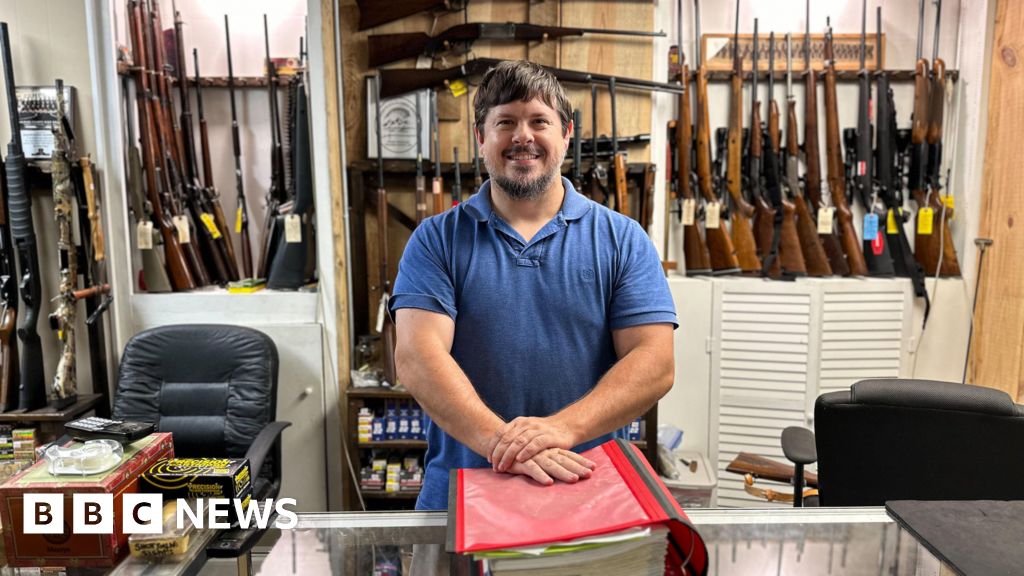
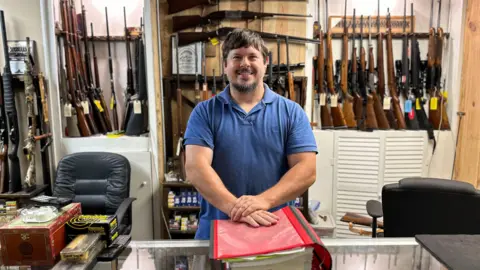 bbc
bbcKennesaw, Georgia, has all the small-town details one could imagine in the American South.
There is the smell of baking cookies coming from Honeysuckle Biscuits & Bakery and the rumble of a nearby train. It’s the kind of place where newlyweds leave handwritten thank you cards in coffee shops, praising the “cozy” atmosphere.
But there’s another aspect of Kennesaw that might surprise some: a city law from the 1980s that legally requires residents to own guns and ammunition.
“It’s not like you’re walking around carrying it on your hip like you’re in the Wild West,” said Derek Easterling, the city’s three-term mayor who describes himself as a “retired Navy guy.”
“We’re not going to knock on your door and say, ‘Let me see your gun.'”
Kennesaw’s gun law clearly states: “To ensure and protect the general safety and welfare of the city and its inhabitants, every head of household residing within the limits of the city must have a firearm, together with ammunition “.
Residents with physical or mental disabilities, felony convictions or conflicting religious beliefs are exempt from the law.
To Mayor Easterling’s knowledge, and that of multiple local officials, no prosecutions or arrests have been made for violating Article II, Sec 34-21, which went into effect in 1982.
And no one the BBC spoke to could say what the penalty would be for having committed an offence.
Still, the mayor insisted: “It is not a symbolic law. I don’t like things just for show.”
For some, the law is a point of pride, a nod to the city’s embrace of gun culture.
For others, it is a source of shame, a page from a chapter of history they wish to leave behind.
But the main belief among townspeople about the gun law is that it keeps Kennesaw safe.
Customers eating slices of pepperoni at the local pizzeria will propose, “If anything, criminals should worry, because if they break into your house and you’re there, they won’t know what you have.”
There were no murders in 2023, according to Kennesaw Police Department data, but there were two gun suicides.
Blake Weatherby, a groundskeeper at First Baptist Church of Kennesaw, has different opinions on why violent crime might be low.
“It’s the attitude behind guns here in Kennesaw that keeps gun crime down, not the guns,” Weatherby said.
“It doesn’t matter if it’s a gun, a fork, a fist or a high-heeled shoe. We protect ourselves and our neighbors.”
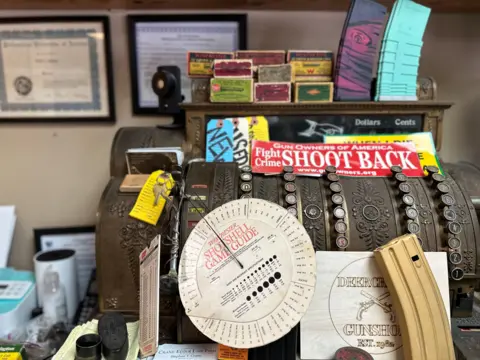
Pat Ferris, who joined the Kennesaw City Council in 1984, two years after the law was passed, said the law was created to be “more of a political statement than anything else.”
After Morton Grove, Illinois, became the first American city to ban gun ownership, Kennesaw became the first city to require it, generating national news headlines.
A 1982 New York Times op-ed described Kennesaw officials as “jovial” about the law’s passage, but noted that “Yankee criminologists” were not.
Penthouse magazine published the story on its cover with the words Gun Town USA: An American city where it is illegal not to own a gun printed over an image of a blonde woman in a bikini.
Similar gun laws have been passed in at least five cities, including Gun Barrel City, Texas, and Virgin, Utah.
In the 40 years since Kennesaw’s gun law was passed, Ferris said, its existence has virtually faded from consciousness.
“I don’t know how many people even know the ordinance exists,” he said.
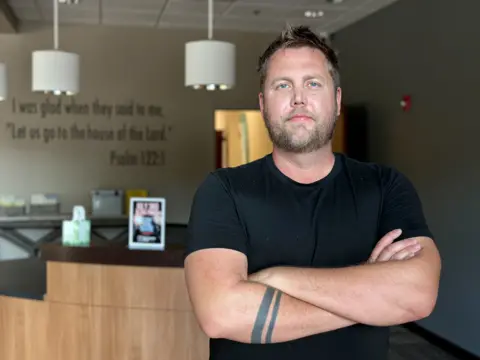
The same year the gun law went into effect, Mr. Weatherby, the church gardener, was born.
He recalled a childhood in which his father half-jokingly told him, “I don’t care if you don’t like guns, it’s the law.”
“I was taught that if you’re a man, you should have a gun,” he said.
He is now 42 years old and was 12 years old the first time he fired a gun.
“I almost dropped it because it scared me so much,” he said.
Weatherby owned more than 20 guns at one point, but now said he doesn’t own any. He sold them over the years, including the one his father left him when he died in 2005, to get through tough times.
“I needed gas more than guns,” he said.
One place he could have gone to sell his firearms is the Deercreek Gun Store located on Kennesaw’s Main Street.
James Rabun, 36, has worked at the gun store since graduating high school.
It’s the family business, he said, opened by his father and grandfather, who can still be found there today; his father in the back restoring firearms, his grandfather in the front relaxing in a rocking chair.
For obvious reasons, Rabun is a supporter of the Kennesaw gun law. It’s good for business.
“The good thing about guns,” he said with great enthusiasm, “is that people buy them for self-defense, but a lot of people like art or bitcoins, things that are in short supply.”
Among the dozens and dozens of guns for sale hanging on the wall are double-barreled black powder shotguns, similar to a musket, and some 19th-century Winchester rifles that are “no longer in production.”
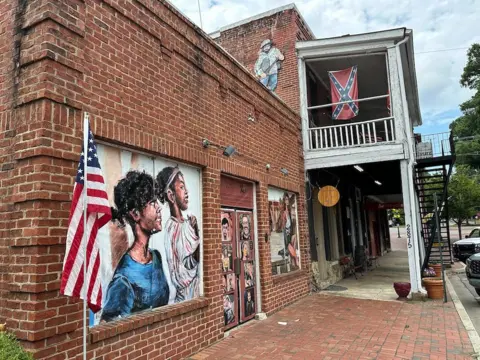
In Kennesaw, the gun fanatic has a wide reach that extends beyond gun store owners and middle-aged men.
Cris Welsh, mother of two teenage daughters, is not ashamed of owning guns. She hunts, is a member of a gun club, and shoots at the local gun range with her two daughters.
“I’m a gun owner,” she admitted, listing her inventory as including “a Ruger pistol, a Baretta, a Glock and about a half-dozen shotguns.”
However, Mrs. Welsh doesn’t like Kennesaw’s gun law.
“I’m embarrassed to hear people talk about gun laws,” Welsh said. “It’s just an old Kennesaw thing to hold on to.”
He hoped that when outsiders thought about the city, they would remember the parks, the schools and the community values, not the gun law “that makes people uncomfortable.”
“There’s a lot more to Kennesaw,” he said.
Councilwoman Madelyn Orochena agrees that the law is “something that people would rather not publicize.”
“It’s just a strange little fact about our community,” he said.
“Residents will roll their eyes in embarrassment or laugh at it.”